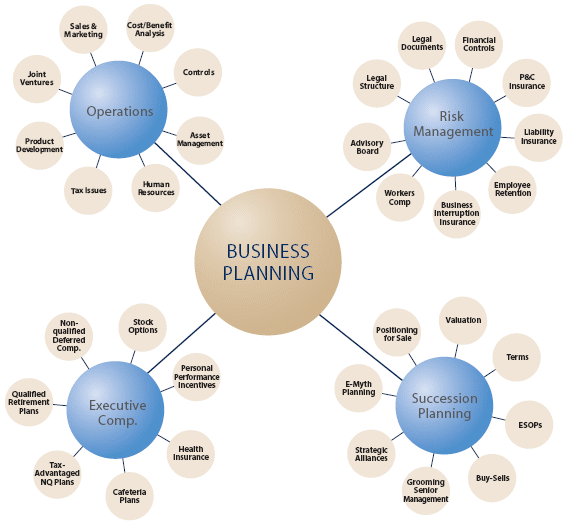 There are a number of reasons why planning is necessary:
There are a number of reasons why planning is necessary:
1. The future is not an extension of the past.
2. The rate of change in the marketplace will continue to accelerate.
3. Technological progress is taking place at an extraordinary rate.
4. Regulatory issues require constant attention.
5. Population changes, demographics, and geographic shifts require constant adjustment of marketing strategies.
6. Global competition is common in almost every industry.
7. Business success/failure experience is changing.
8. Organizations and the workforce are becoming more complex.
Types of Business Planning
Here are the types of planning that companies engage in and some key issues involving each:
Strategic: What businesses is the company in, and what businesses should it be in?
Marketing: Why do customers buy the company's products, and why should they? This should also include discussions of pricing, quality, and service strategies.
Sales effort: Should the company sell through a dedicated organization, through distributors, or via the Internet?
How can marketplace awareness of the company's products be improved?
Operations: What is the supply chain strategy? How can technology improve customer service and reduce inventory at the same time? What functions can be more efficiently outsourced? How will demographic changes affect the workforce in the future?
Financial: How much free cash flow does the company expect to generate? What are the internal (capital expendiBusiness tures) and external (debt service) demands made upon these funds?
Requirements for Effective Planning
There are a number of elements that are required if planning is to be effective.
1. Management must provide:
- Conspicuous support
- Active participation
2. Goals must be quantifiable. In addition, if they are to be useful, goals must be:
- Time-related
- Measurable
- Attainable
- Simple to calculate
- Realistic
3. This is a profit center effort with staff support.
4. Performance expectations should be reflected in the budget.
5. The effort should be relatively flexible and simple. It should not constrain creativity, judgment, and risk taking.
Planning and Management
For planning to be effective, profit center managers need to have:
- A clear understanding of their job responsibilities
- Good leadership through constant, clear communication of plans, goals, and direction
- The opportunity to participate in planning and decision making
- Recognition of their achievements
- A performance appraisal system that gives them the opportunity to discuss advancement
- Professional working conditions that are conducive to productivity and effectiveness
- Compensation that is related to their accomplishments and responsibility
- The opportunity to take normal business risks in a nonpunitive environment, without fear of excessive reprisals
Human Tendencies in Planning
There are a number of human tendencies that can interfere with or restrict the company's planning process.
Optimism: The belief that performance will improve over the next few months
Short-term orientation: An emphasis on quarterly and monthly goals and reviews, with the period beyond the first year deemphasized
Oversimplifying the environment: Not anticipating competitive reactions to the company's moves
Assuming that the past will extend into the future Point forecasting rather than forecasting a range of outcomes
Unwillingness to face tough issues: Postponing corrective actions in the hope that the problem will disappear
Devoting attention to issues that are interesting but not critical
Ambiguity in strategic definition:
- Overstating cash flow expectations
- Understating capital needs
- Having inadequate strategic coordination
- Minimizing the difficulty of change:
- Entering new, relatively unknown marketplaces
- Not adequately planning and testing new ventures
Reasons Why People Resist Planning
There are a number of reasons why people resist the planning process:
- They have an unclear understanding of the benefits that can result.
- Planning is time-consuming.
- Planning requires intuitive thinking rather than doing.
- The process requires writing plans and sharing them with others.
- The process involves accountability; it creates an environment in which they will be measured and critiqued.
- People often define themselves by what they do rather than by how they contribute to the organization's profitability and success.







